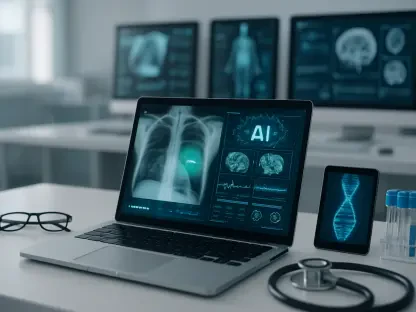I’m thrilled to sit down with James Maitland, a renowned expert in robotics and IoT applications in medicine, who brings a deep passion for harnessing technology to revolutionize healthcare. With a keen understanding of how innovations like artificial intelligence can address pressing challenges, James offers unique insights into the intersection of AI and healthcare operations, particularly in the realm of contract management. In this conversation, we explore how AI can alleviate financial and regulatory burdens, transform underutilized assets like contracts into powerful tools, debunk common misconceptions about AI’s role, and ultimately redefine value creation for hospitals and health systems as we look toward the future.
How do you see AI stepping in to tackle the financial and regulatory pressures that healthcare providers are grappling with today?
AI has immense potential to ease the strain hospitals face from shrinking budgets and evolving regulations. Financially, it can pinpoint inefficiencies in contracts, like overpayments or missed rebates, which often go unnoticed in manual processes. On the regulatory side, AI can streamline compliance by automating the tracking of mandates like HIPAA or CMS requirements, ensuring hospitals stay ahead of audits. It’s about giving providers breathing room to focus on patient care rather than drowning in paperwork or penalties.
Why do you think contracts are often an overlooked asset in healthcare, despite their critical role in managing revenue?
Contracts are the backbone of every financial transaction in healthcare, yet they’re often treated as static documents tucked away in digital folders. Many hospitals lack the tools or time to actively manage them, so opportunities to optimize payer agreements or supplier terms slip through the cracks. Without a proactive approach, contracts become a liability rather than a lever for resilience and growth.
What are some of the biggest hurdles hospitals face when managing contracts manually?
Manual contract management is a nightmare of inefficiency. Staff spend countless hours digging through PDFs for specific clauses, verifying obligations, or updating templates to match new regulations. Errors are common, and missed deadlines or untracked terms can lead to revenue leakage or compliance risks. It’s a labor-intensive process that drains resources from more strategic priorities.
How can AI transform the way contracts are handled to unlock hidden value for healthcare systems?
AI can revolutionize contract management by automating tedious tasks like clause extraction or obligation tracking across thousands of agreements. It surfaces critical insights—like escalation caps or pricing terms—instantly, so teams can act on them. This not only cuts down on errors and cycle times but also empowers hospitals to negotiate better deals and protect margins, turning contracts into a strategic asset.
There’s a concern that AI might replace human workers in healthcare roles like contract management. How would you address this fear?
I understand the worry, but AI isn’t here to replace people—it’s here to support them. In contract management, AI takes over repetitive, time-consuming tasks like data entry or searching for terms, which frees up staff to focus on high-value work. The human element—judgment, empathy, and strategic thinking—is irreplaceable, especially in healthcare. AI just makes the mundane stuff faster and more accurate.
What specific tasks in contract management can AI handle to complement rather than compete with human staff?
AI excels at handling grunt work like scanning contracts for key provisions, flagging discrepancies, or generating reports on compliance status. It can also automate reminders for renewal dates or payment terms, reducing the risk of oversight. These are tasks that bog down teams, and AI’s ability to manage them allows staff to dedicate their energy to more complex challenges.
Many health systems use AI, but often not to its fullest potential. What’s holding them back from deeper adoption?
A lot of hospitals start with basic AI tools like chatbots or transcription services, which are helpful but limited in scope. The hesitation to go deeper often comes from a lack of awareness about what advanced AI can do, combined with fears of cost or complexity. There’s also a cultural resistance to change—many organizations stick to familiar methods like spreadsheets, even when they’re inefficient, because that’s what they know.
How can advanced AI solutions with analytics and automation make a more significant impact compared to basic tools?
Advanced AI goes beyond surface-level assistance by integrating with hospital systems to provide real-time analytics and automated workflows. For instance, it can shorten contracting cycles by predicting bottlenecks, reduce revenue loss by identifying unfavorable terms, and enhance compliance by monitoring obligations. Unlike basic tools that just summarize data, these solutions drive measurable outcomes that directly impact the bottom line.
Some believe AI is too costly or complex for healthcare settings. How would you counter this perception?
That’s a fair concern, but modern AI platforms are designed to be accessible. Many integrate seamlessly with existing systems like ERPs or EHRs, so there’s no need for a complete overhaul. The upfront investment is often offset by quick returns—like reduced labor costs or avoided penalties. AI doesn’t have to be a massive, disruptive project; it can be rolled out incrementally to deliver value without breaking the bank.
Can you share an example of a practical AI solution that offers immediate benefits for healthcare providers?
Absolutely. Take AI-powered contract intelligence platforms—some are built specifically for healthcare with pre-configured templates and analytics. These tools can cut physician onboarding times by automating credentialing agreements or optimize payer contracts by flagging underperforming terms. Hospitals see results fast, often within months, in the form of cost savings or improved compliance readiness.
There’s a fear that AI might introduce risks or weaken regulatory oversight. How can it actually strengthen compliance in healthcare contracting?
Far from creating risks, AI bolsters compliance by embedding governance into everyday processes. It provides real-time visibility into contract obligations, so hospitals can monitor adherence to regulations like the 340B drug-discount program or HIPAA rules. By automating audit trails and flagging potential issues before they escalate, AI helps providers stay accountable and builds trust with regulators and patients alike.
What’s your forecast for the role of AI in healthcare contracting as we approach 2026?
I believe by 2026, AI will be a cornerstone of healthcare contracting, no longer seen as a novelty but as a necessity. As financial and regulatory pressures intensify, more hospitals will adopt AI to manage volatility, optimize agreements, and protect margins. We’ll likely see broader integration of enterprise-grade AI solutions that not only automate processes but also predict trends and risks, enabling providers to lead with confidence in an increasingly complex landscape.









